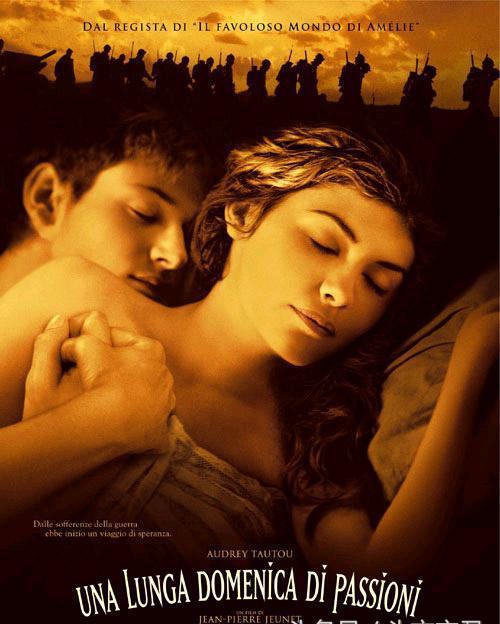The French film "The Long Marriage" that was sentenced to be an American film: This is a film about love, hope and perseverance, which will not only bring you excellent musical enjoyment, but also give you something else worth remembering.

The film received twenty nominations for the French César Awards and won five awards, including Best Cinematography and Best Supporting Actress. The film is based on sebastian Zaprezzo's best-selling novel of the same name. The film spends a lot of ink to depict the battlefield scenes of the First World War, showing the cruelty and madness of the battle with extremely complicated details, and setting off the atmosphere of the war with strong picture and sound effects. This is in stark contrast to the comfortable pastoral life of the previous heroine.
Director Jean-Pierre Genet and actress Audrey Totu approach the tender themes of war in the same way as Angel Amelie. The director's black style is also reflected in the soldiers' encounters on the battlefield. The film, like "Angel Emily," was a box office success.
Filming this film was the dream of director Jean-Pierre Genet for 10 years. In 1991, Genébas read Sebastian Zaprizo's novel of the same name, and he was deeply attracted by the characters, and he wrote the novel in one fell swoop, and the impulse to make the novel into a movie was stirred. At that time, René had just completed his feature film debut "Rhapsody of the Black Shop", and the right to shoot this novel was Warner, and for a young director who had just entered the industry and was not well known, shooting "The Long Marriage" was almost a distant dream.
10 years later, with "Angel Amelie" being greatly praised by the world film industry, the famous René once again ignited his initial enthusiasm, and at this time, he had found his magic weapon - Audrey Tato. On Oscar night, René asked his "Amelie" if he would like to continue to work with him, and Tatoo cheerfully replied: "Of course, if it is the original team." ”
René decided to shoot in France, and with the French in front of and behind the scenes, Warner accepted René's terms and was willing to pay 35% of the filming budget.
The most praiseworthy thing is the director's narrative method. Although flashbacks, interludes and other techniques are also used, the film goes further, cutting the story into small fragments, disrupting it, and then cleverly splicing it together from different perspectives of different characters, and slowly spelling out a complete image as the plot progresses. The story itself has a bit of suspense, puzzle-solving nature, and through such editing, the director makes a story that may fall into the cliché novel and attractive.
The articulation between the fragments is smooth and natural, and the narrative rhythm is relaxed. The film also shows the director's usual cinematic language: the corresponding picture is displayed at the same time as the narration, "picture-in-picture", and the occasional French humor and exaggeration. These elements make an otherwise heavy film warm and interesting.
In addition to reflecting the pain brought by the war, in addition to the pure love of the male and female protagonists than Jin Jian, the film more importantly praises the optimism, persistence and strength of the heroine. When the clues were broken, the fiancée did not give up the search, did not have compassion for people, did not stand as a stone of hope, but used all clues and traces, relying on women's unique intuition, to start the road of finding a husband again.
The divination game that the fiancée often meditates on in her heart is a stroke of genius, "If I count to 7 and the train has not yet reached the cave, then the fiancé is not dead." "I think a lot of people have played this kind of game when they are waiting for people, and it will definitely resonate."
At the end, the heroine slowly walks through the dim corridor, no soundtrack, no narration, a silence, as if time freezes, breathing stops, after a thousand hard dreams finally become a reality, that mixed feelings can only be expressed by silence. It wasn't until the heroine walked out of the corridor and the brilliant sun shone on her face that the music slowly sounded, and although the protagonist always smiled, I was in tears.